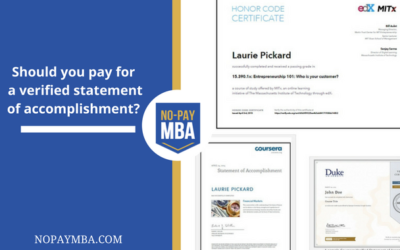A Complete Guide to Getting an MBA-Level Business Education at a Fraction of the Cost
Learn More

Laurie Pickard
Author of Don't Pay For Your MBA
Hi! I’m Laurie. I used massive open online courses (MOOCs) from platforms like Coursera and edX to get a business education equivalent to an MBA - for less than 1/100th the cost of a traditional MBA degree.
My journey with MOOC-based education began when I saw an opportunity to build the business education I had long desired without going into debt. For me, as an international development worker, MOOCs had the added benefit of being accessible from anywhere.
My book and the resources on this site are for anyone seeking a world-class business education using the free and low-cost tools of the internet. I hope you find them useful!
The No-Pay MBA Blog
Are MOOC Discussion Forums Good for Anything? How to Make them Work for You
If you’ve been reading my blog for a while, then you know that my MOOC pet peeve is when professors require students to post on discussion forums as a part of the course grade. It creates a lot of meaningless chatter - one person writes something mildly intelligent, and a hundred others post something to the effect of “I agree.” In general, I avoid courses that come with such a requirement. But I decided to look past this bias when I registered for “Beyond Silicon Valley: Growing Entrepreneurship in Transitioning Economies.” As I’ve written previously, this course was enormously relevent to my work. So rather than let my negative feelings about obligatory posting get in the way of my experience, I decided to make the course a laboratory for experimenting with how to get the maximum value out of discussion forums.
Here is what I learned:
1. Skip the Introductions Thread
Maybe you want to glance through the introductions, skimming for anything particularly interesting. But in general, the introductions thread is a blur of names and nationalities and people expressing their excitement about the course. Instead of making that your starting point, I suggest thinking about the kinds of people you’d be most interested in engaging with or what you’re hoping to learn in the course. Then instead of reading post by post, search the entire discussion forum on those topics and see what comes up. For example, I usually start by searching on “Rwanda” and “Africa” to see who else is taking the course from my neck of the woods.
If nothing comes up, or if the posts on your topics of interest are scattered within the forum, start your own discussion thread based on geography, background, or field of interest.
read moreMBA Year 2
I’m back from summer vacation!
It was a wonderful and much-needed break, thanks for asking. I feel refreshed and ready to dive into year two of my MBA course work. During my travels, I also had some time to think about where I’m going with this project. I’m looking forward to sharing some of these insights over the coming semester.
Here is a taste of what’s coming next:
Themes of the semester
Two courses recently caught my attention, and I didn’t want to miss either one of them. So rather than choosing the theme and finding courses to match it, this time I chose the theme based on the courses I wanted to take. The courses are Foundations of Business Strategy and Social Psychology. The theme I’ve devised to fit these two courses I’m calling Inside an Organization. For the next ten weeks or so I’ll be focusing on decision-making and interpersonal relationships within businesses.
The next theme I’m gearing up to tackle is Data Analysis. Math-heavy courses require the biggest time commitment, so I’m waiting to start this unit until my schedule is a bit clearer. When learning new math skills, you can forget about multi-tasking; you can’t watch a course video while folding laundry or getting ready for work. Since many data analysis courses are available through paid providers like Lynda, Udemi, and Udacity, I’m also planning to use that unit to try to answer the question of whether you should pay for online courses.
What about the MBA network?
It has been pointed out to me on more than one occasion that part of what you pay for in an MBA degree program is the exceedingly valuable MBA network. I realize that this is a big gap in my self-administered course of study, and I’ve been working hard to close it. In future posts I will share some of the solutions I find most promising. I’ll also reflect on my experience forming virtual study groups, using MOOC discussion forums for networking, and pursuing virtual internship opportunities.
read moreUnlocking the MOOC Marketplace, Part 2: Expanding Access
Here’s the paradox of MOOC education: while MOOCs offer the greatest potential for those lacking access to university education, so far the majority of the people who use MOOCs (nearly 80% in one study, 66% in another) already possess university degrees. Some people have taken this statistic - along with the finding that over 90% of students don’t finish the MOOCs they register for - as evidence that MOOCs are a failed experiment in increasing access to higher education.
Though MOOCs are far too young to be deemed a failure, these statistics are telling.
But question is not, are MOOCs a failure? Rather, the question is, how can MOOCs better serve the market?
In the first post in this series, I described two markets for higher education – one comprised of selective colleges and universities and the students who attend them, and another that can be characterized as non-selective. Understanding the differences between these two markets is key to finding sustainable business models within the MOOC space. As I said in my previous post, the key word to describe the needs of the market for non-selective higher education is ACCESS.
What would it take for MOOCs to reach their potential for expanding access to higher education?
In this post I will talk more about what it would take for MOOCs to meet the needs of the market segment that typically has lower access to higher education, focusing on three things - credentials, work-relevance, and support - and the business opportunities that exist in all these areas.
read moreUnlocking the MOOC Marketplace, Part 1: A Tale of Two Markets
My husband the economist loves to forward me economic research papers about MOOCs and higher education. One of these papers, from the National Bureau of Economic Research (NBER) has really stuck with me as I try to make sense of what MOOCs mean for higher education. It’s called “The Economics of Online Post-Secondary Education: MOOCs, Nonselective Education, and Highly Selective Education.” You can find it here - but FYI, you won’t be able to access it unless you have a .gov email address or are willing to pay five dollars for it.
So let me summarize for you: in the paper, the author describes two markets for higher education – the selective market (think grassy quadrangles and philosophical debates among knowledge-hungry 18-to-22-year-olds) and the nonselective market (think students who work full time while studying, commuter campuses, and associates degrees). To participate in the selective market, would-be students have to go through a rigorous admissions process, while anyone with a high school diploma or equivalency can participate in nonselective higher education.
These two markets operate under vastly different business models. Selective higher education is mostly funded with huge endowments, secured by giving students such a wonderful college experience that they are inspired to give money to the school years after graduation. In this model, tuition doesn’t begin to cover the cost of educating students, but it doesn’t matter because the real money comes from alumni giving. The nonselective market is the opposite. Students pay a tuition that mostly covers the cost of educating them, with no expectation that they will give money to the institution in the future. To summarize, the selective market functions like a venture capital equity market – with students as the investment – while the nonselective market is a market for service provision.
And it isn’t just the revenue models that differ between these two higher education markets. At nonselective institutions, curricula are more standardized, many people are capable of competently teaching the material, interactions with professors are fewer, dropout rates are higher, attendance can be episodic, and graduation within four years is the exception to the rule. In contrast, at selective institutions, course content is original, only a small group of professors is able to teach the material – which often draws on the latest research, interactions with professors are ubiquitous, dropouts rates are low, most students attend full time, and the majority finish within four years.
Why is this important? It matters for understanding MOOCs’ potential for disruption.
read moreNo time to study?
Recently, I’ve experienced a significant increase in the demands on my time. First, I’ve been busier at work. Second, I’ve taken on the job of managing the finances for the commissary at the US embassy in Kigali. Third, I’ve been revamping my site and have simultaneously been getting more requests for guest posts on other sites. And of course I haven’t stopped taking MBA courses. In fact, I am currently taking three MOOCs instead of my usual one to two. This jam-packed schedule has required some creative thinking on how to fit in course work on top of everything else, but I have been unwilling to drop any of my courses.
Here’s why I’m committed to sticking with all three courses and how I’m managing to fit everything in.
read moreStudy Tips from a MOOC Master
I’m excited to present another student profile. Joris is from Utrecht, Netherlands. He reached out to me describe an ambitious MOOC course load, focused on business and education – he’s taking more than 10 MOOCs at once! I was surprised to find out that Joris is simultaneously enrolled as a university student. Below Joris shares his reasoning for taking so many courses and some great tips for MOOC students taking a full course load.
read moreShould you pay for a verified statement of accomplishment?
I’m currently taking three courses – two from Coursera and one from edX. All three come with a final course certificate, and all three offer an upgrade option for that certificate. In my two Coursera courses, the “Signature Track” option comes with a “Verified Statement of Accomplishment;” in my edX course, I can choose to enroll as an “ID-verified” student to get a “Verified Certificate of Achievement.”
So far, I haven’t spent any money on course certificates. Frankly, I wasn’t convinced the first time Coursera asked me to join a course’s Signature Track, and I still don’t see the added value.
What exactly is a verified course certificate?
Both Coursera and edX offer essentially the same product. For a fee ($49 on Coursera, $25 on edX), you can verify your identity by submitting a typing sample and snapping your image on a webcam. On subsequent logins, the system makes sure that you are the same student as before. At the end of the course you get a slightly snazzier-looking certificate than you otherwise would, with the word “verified” on it.
The value proposition for this product is based on four assumptions:
Course certificates have value to students.
Students will cheat to get these certificates, so there is value in ensuring that the person who holds the certificate is the same person who completed the course work.
Webcam photos and typing samples are an effective way of verifying a person’s identity.
Employers (or other third parties) know the difference between verified and non-verified course certificates.
read moreWhy Women Should Take Business MOOCs
Ladies, the numbers don’t look good. Though there isn’t much data specific to business courses, those studies that have been done on MOOC enrollment rates point to an overall trend of many more men than women taking advantage of free online courses. The numbers vary, but the story is largely similar. In one study of MOOC users, female students were 41% of the population; in another, they were only 36%. EdX recently released a profile of its users, only 29% of whom are women. As one article summarized the research, “students tend to be young, well-educated males who are trying to advance in their jobs.”
I got started thinking about this topic when I clicked on the first video lecture for Wharton’s Introduction to Marketing and found myself surprised to see a female professor. I’m not sure why it didn’t occur to me before that moment, but I realized that almost all of my MOOC professors have been men. I did one short course on human resources taught by a woman, and there were a couple of brief units taught by women in my course on international organizations management, but the vast majority of my courses so far have been taught by men. This got me thinking about women’s participation in MOOCs, both as students and as professors.
Though I didn’t find any formal research, preliminary evidence suggests that the stats among MOOC professors are even worse than those among MOOC students.
Now that I’ve shared these disheartening statistics, let me tell you why I’m optimistic about the potential of business MOOCs to be a great boon to women.
read moreWhy You Should Sometimes Do Things You’re Not Naturally Good At
I believe that discovering what you’re naturally good at and finding ways to do more of it is the key to success and fulfillment. This is the premise behind an excellent book called Strengths Finder 2.0, a few years old now but still an inspiring read. At the same time, it’s sometimes worthwhile to push yourself to do those things that don’t come easily. If you’ve been reading my blog for any amount of time you will probably have surmised that I am a much better writer than I am a web developer. Having to design and manage a website is a necessary evil I’m willing to deal with in the name of getting my message out. Trying to make my site actually look good takes more design mojo than I’ve ever previously tried to muster. I’ve learned to make use of help forums, YouTube video tutorials, and the occasional support call to my web hosting company. Let me tell you, what these people call “help” sometimes feels like a cruel joke. That said, developing a website has also been a surprisingly rewarding process. When I do buckle down and try to get a page or a post exactly right, I often get completely sucked in. Hours pass. I forget to eat. I enter a state of flow, which happens only when you’re doing something that is just difficult enough to require all of your attention, without being so far above your ability level that you give up. Though I’m not naturally gifted in web development, I am improving. My confidence grows each time I’m able to solve (or work around) some intractable problem. Like trying to make a small image fill a slider. Or trying to match the color of my logo exactly to the color of my hyperlinks. (I think I got it pretty close!) I also believe there are probably some spiritual benefits to the practice of slowly getting better at something that doesn’t come easily. It teaches you patience, humility, resilience. Small triumphs feel monumental. So why am I telling you this? Two reasons: One, I revamped my Curriculum page today, and I’m so proud of it. Before, it was a static jpeg image taken from an excel spreadsheet. Now, it has links to all the courses I’ve taken, all the blog posts I’ve written about my specific courses, columns of different sizes, and even an image slider. I think it does a much better job of cataloguing my coursework, and I expect it will be a much more useful tool to anyone who visits my site and is interested in following my example. I encourage you to take a look.
read moreMBA via MOOC: Getting Beyond Intro Level
These days you can find MOOCs on everything from Quantum Physics to Music Production and many other topics in between. But MOOCs don’t cover everything – at least not yet. Beyond the intro courses and the one-offs (Intro to Knitting Socks?), the options grow a bit more thin. Though I haven’t yet exhausted the available business courses – far from it – I anticipate a challenge when it comes to covering the more advanced topics that are part of a traditional MBA, as well as getting into greater depth on certain niche topics of particular interest for me.
One approach I have considered is to forget about the advanced stuff and just focus on the fundamentals. Honestly, how much do you remember from a degree program a few years out of school? If you have the basics and the overall approach down, most of the specifics of any given job you learn by actually doing that job. But while I do still plan to drill the fundamentals – perhaps more so than one would in a regular MBA – I have come up with some strategies that I think will allow me to go beyond first year coursework, even if I don’t find MOOCs to cover everything I want to learn.
read moreMOOC with rock-star professor comes with the frustrations of the classroom
I’ve taken about a dozen business MOOCs so far as part of my effort to construct the equivalent of an MBA, for free. I’m always on the lookout for new courses, and I was excited when Coursera released “Financial Markets” with Nobel Prize-winning economist and Yale University professor Robert Shiller. I had previously come across another version of this course through Open Yale, a site run by Yale University where anyone can access no-frills video and audio of lectures that were delivered live in the classroom. I started the Open Yale lecture series but didn’t finish it because Coursera announced their version of the same course when I was only partway through. I generally prefer Coursera’s condensed, made-for-online format, so I stopped listening to the Open Yale lectures and signed up the Coursera version.
When I first got interested in MOOCs, I read several articles decrying MOOCs as furthering the phenomenon of “rock-star professors,” the idea being that big-name profs reduce the number of jobs available to lesser-known professors and diminish the quality of university teaching, since they typically teach to packed lecture halls where one-on-one interaction is practically impossible. Being an online student with no hope of actually speaking with my professors, I am excited about the idea that I might take a course from a renowned professor, even as one of thousands. Robert Shiller is about as renowned as they come. He basically predicted the 2008 financial crisis in his best-selling book Irrational Exuberance, and he won the Nobel Prize in Economics 2013, among many other career achievements.
Unfortunately, in its attempt to package Professor Shiller’s course for an online audience, Coursera missed an opportunity to use the MOOC format to surmount some of the obstacles inherent in teaching en masse.
read moreOne Reason MOOC Completion Rates Are So Low
Around 90% of MOOC enrollees don’t finish the courses they’ve signed up for. I’ve taken about a dozen MOOCs so far and this is the first one I’ve been unable to finish. Even though I didn’t intended to take all the courses I registered for, I’ve found it difficult to take the step of actually withdrawing from Evaluation Financière de l’Entreprise – I guess I don’t want to admit that I’m actually quitting, even if in practice I already have. From the first week, it was clear that studying a difficult subject in a foreign language was going to require more time and energy than I typically budget for a MOOC. I spent the entire first video wondering what “action” the professor was referring to when he spoke about the “value per action” before realizing that “action” translates as “share.” I experienced a similar confusion with the word “bénéfice,” which translates not as “benefit” but as “earnings.” Unfortunately, by the time I had figured out that “benefit per action” was actually “earnings per share,” I had to go back and watch the whole lecture again.
read more











